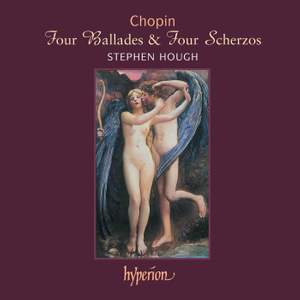Chopin - Four Ballades & Four Scherzos
Stephen Hough (piano)
In the use of words like sensational, extraordinary, phenomenal, etc., critics have to be sparing, at risk of their credibility. But these adjectives are all appropriate to this new Chopin recital... — More…
-
Gramophone MagazineMay 2004Disc of the Month
CD
$15.75Downloads
What are FLAC and MP3?Contents
Chopin: Ballade No. 1 in G minor, Op. 23
Work length9:13
$1.10
$1.50
$2.05
- Stephen Hough (piano)
Chopin: Scherzo No. 1 in B minor, Op. 20
Work length9:20
$1.10
$1.50
$2.05
- Stephen Hough (piano)
Chopin: Ballade No. 2 in F major, Op. 38
Work length6:53
$1.10
$1.50
$2.05
- Stephen Hough (piano)
Chopin: Scherzo No. 2 in B flat minor, Op. 31
Work length9:47
$1.10
$1.50
$2.05
- Stephen Hough (piano)
Chopin: Ballade No. 3 in A flat major, Op. 47
Work length7:04
$1.10
$1.50
$2.05
- Stephen Hough (piano)
Chopin: Scherzo No. 3 in C sharp minor, Op. 39
Work length7:09
$1.10
$1.50
$2.05
- Stephen Hough (piano)
Chopin: Ballade No. 4 in F minor, Op. 52
Work length10:47
$1.10
$1.50
$2.05
- Stephen Hough (piano)
Chopin: Scherzo No. 4 in E major, Op. 54
Work length11:13
$1.10
$1.50
$2.05
- Stephen Hough (piano)







